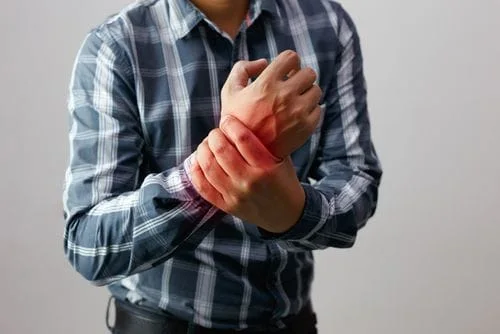What are Pain Injections?
Pain injections are a form of integrative medicine therapy for patients dealing with chronic pain and illness. They may also sometimes be referred to as injection therapy.
We recommend injection therapy as a non-invasive form of pain management when other traditional treatment methods have failed to alleviate the symptoms of pain and discomfort for our patients. Factors that affect what kind of injection therapy is administered depending on the patients:
- overall health and medical history
- current symptoms of pain
- location on the body
- prior treatments that have proven ineffective at pain management
What are the Different Types of Pain Injections?
Using an integrative approach to treating the symptoms of pain, we offer our patients the four different types of pain injections depending on their illness:
- Joint Injections Therapeutic joint injections are used to treat inflammation of the joints caused as a result of arthritis, including gout and rheumatoid arthritis. A high dose of steroid is injected directly into the joint to provide anti-inflammatory effects.
- Ozone Joint Injections Used to treat the symptoms of knee osteoarthritis, ozone joint injections use ozone oxygen to:
- help increase oxygenation of the tissues
- promote anti-inflammatory effects in the joint, relieving the symptoms of pain. We recommend these injections to patients who are looking for non-surgical methods of therapy to treat their knee osteoarthritis symptoms or who do not respond well to steroid injections.
- Tendon Sheath Injections Inflammation of the tendon sheaths that line our body tendons leads to a condition known as tenosynovitis. Repetitive motion, strain, infection, or the presence of inflammatory diseases such as arthritis are thought to be the cause of tenosynovitis. Tendon sheath injections, composed of steroids, are administered to patients to decrease inflammation and symptoms of pain after traditional forms of treatment have proven ineffective.
- Trigger Point Injections Trigger point injections target the taut bands of painful muscle knots. Known as trigger points, these knots are caused due to injury, lack of exercise, repetitive stress injuries, postural issues, aging, lack of restful sleep, and vitamin deficiencies. Our trigger point injections use an anesthetic known as lidocaine to help break up the tight muscle bands and alleviate your symptoms of pain and tightness.
Common Symptoms We See in Our Patients
Patients that are good candidates for injection therapy experience the following symptoms:
- Muscle weakness
- Muscle tightness
- Arthritis and degeneration of joints such as the knees and elbows
- Pain that radiates to other parts of the body
- Decreased range of motion
- Headaches
- Body aches
What is Causing My Need for Pain Injections
We recommend pain injections for our patients suffering from chronic pain conditions and no longer receive any benefit from traditional forms of treatment such as physical therapy and NSAIDs.
A complete physical exam, including evaluation of your current symptoms and prior medical history, is essential in correctly diagnosing and treating the symptoms of pain. Pain injections are often the final form of therapy before surgical procedures are sought to decrease pain.
How Will You Treat My Pain
Pain injections are a minimally-invasive procedure where your medical provider injects a liquid steroid, ozone-oxygen, or lidocaine medication into the joint or muscle of concern.
As some joints can be challenging to find, your doctor will use ultrasound-guided imagery to correctly guide them during the procedure, which lasts under an hour in length. It's not uncommon for IV sedation or general anesthetic to be used during the process.
Limiting activity is recommended for the first 24 hours after the injection has been administered. Some patients experience discomfort or a feeling of fullness after the injection. A series of pain injections may be required over a period of several months before a lasting change and decrease in pain can be seen.





